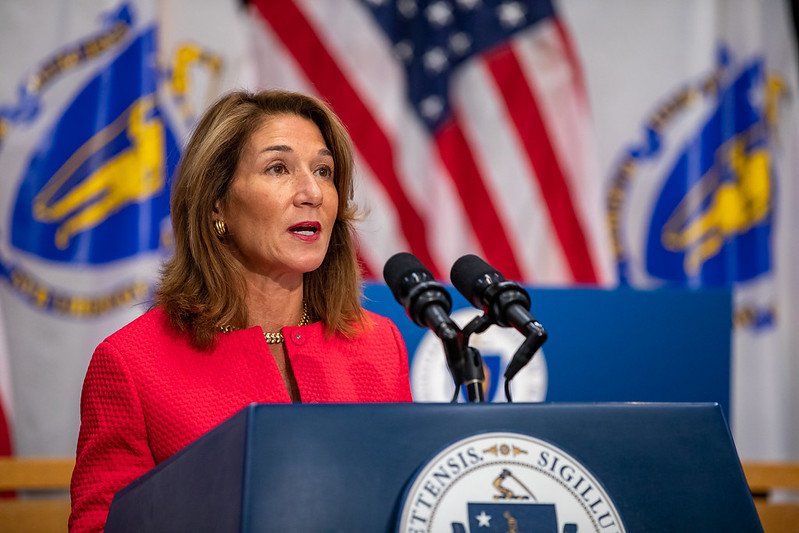[broadstreet zone=”59982″] |
BOSTON — Today, March 4, the Baker-Polito Administration announced a total of $2.5 million in Urban Agenda grants to support 30 projects in 23 communities.
Launched by the Baker-Polito Administration in 2015, the Urban Agenda Grant Program promotes economic vitality in urban neighborhoods by fostering partnerships that capitalize on unique local assets and community-driven responses to specific challenges. Urban Agenda grants are competitive one-year awards that offer these partnerships flexible funding to implement programming and projects based on creative, collaborative work models to support economic progress in urban communities.
To address the unique challenges created by the unprecedented and far-reaching impact of the global pandemic, this year’s program primarily sought proposals that intended to develop or implement COVID-19 economic recovery strategies.
[broadstreet zone=”59984″] |
“Directing these critical resources to support community-led partnerships in neighborhoods disproportionately impacted by the pandemic helps expand our fight against COVID-19,” said Governor Charlie Baker. “We are proud to make these targeted investments in programs that address key needs of urban communities across our Commonwealth, providing vital support to fight the pandemic while also helping to strengthen these communities for the future.”
This year’s Urban Agenda grants represent the largest round of awards since the program started. Since 2015, the Baker-Polito Administration has awarded $8.5 million in grants through the Urban Agenda Grant Program, which is administered by the Executive Office of Housing and Economic Development.
City of Framingham received a $75,000 grant for an Opportunity Hub Project to support the creation of a business resource center where local businesses can have access to business training and workshops. The Center will be located at the main Framingham Library.
“As we continue to navigate the pandemic, Urban Agenda grants are a key tool to help local residents address challenges in communities and neighborhoods especially hard hit by COVID-19,” said Lt. Governor Karyn Polito. “From job training, to programs that mentor entrepreneurs and provide assistance for small businesses expanding their digital profile, these grants harness the communities’ momentum by supporting innovative programs that help them grow and thrive.”
[broadstreet zone=”59948″] |
The Urban Agenda Grant Program is now exclusively part of the Administration’s Community One Stop for Growth, the recently established single-application portal that provides access to a variety of competitive community and economic development grant programs.
The portal will streamline the experience for the applicant and better coordinate the process of engagement, application review, and grant making for programs and staff. It also redefines the Commonwealth’s role as an active partner in economic development strategy, priorities, and investment. Learn more about the One Stop.
“Recognizing the effectiveness of these grants, we are pleased to add the Urban Agenda Grant Program to our One Stop for Growth portal, which will elevate the program’s visibility for prospective applicants,” said Housing and Economic Development Secretary Mike Kennealy. “By including Urban Agenda in the One Stop portfolio, we can apply the same process to rapidly review and approve or refer applicants to this key program to ensure these resources are put to uses that have the highest impact.”
FY2021 Urban Agenda Grant Awards:
Boston – Dorchester – Commonwealth Kitchen: $100,000 for the Restaurant Recovery Initiative, which will help train five Dorchester Black and immigrant owned restaurants with performance and cost-saving measures.
Boston – East Boston – Maverick Landing Community Services: $100,000 for the East Boston Resilience Project, for the creation of two to three new outdoor sustainable markets that will enable immigrant cooperatives to access recycled materials, gain English language skills, and raise family incomes.
Boston – Jamaica Plain – Jamaica Plain Neighborhood Development Corporation: $80,000 for the Constructing Wealth Project, which will provide technical assistance and training to minority- and women-owned business enterprises to build long-term financial stability and create jobs in communities of color.
Boston – Mattapan – Action for Equity: $75,000 for Community Pipeline to Good Jobs, a network that will assist 400 Mattapan residents with job training, job placements, as well as Covid pandemic related food security and eviction protection.
[broadstreet zone=”59946″]
Chelsea – La Colaborativa: $100,000 for the Good Jobs Coalition to support a rapid re-employment program that will provide job assessment, soft skills training, and job navigation counseling to 400 Chelsea Latino and immigrant residents to assist families affected by the pandemic.
Easthampton: $50,000 to fund Blueprint Easthampton, a training program for 10 informal entrepreneurs on business setup and registration. Skills on social media, digital marketing, commerce, and running virtual meetings will also be provided.
Fall River – Bristol County Chamber Foundation: $100,000 for South Main Small Business Initiative to provide financial assistance and staff support to Fall River small businesses. Web training, ecommerce, and emergency relief will be included.
Fitchburg – Fitchburg University/Fitchburg TDI Partnership: $100,000 to support ReImagine North of Main, an initiative to provide technical assistance to help Latino businesses recover from the pandemic and to attract minority businesses to contribute to the arts and cultural economy in Downtown Fitchburg.
[broadstreet zone=”58610″]
Gloucester – Wellspring House, Inc.: $82,000 to support MediClerk Training Program – Gloucester Regional Expansion, a 15-week program to train 10 low-income women and minority trainees in administrative skills in the health care sector. Job shadowing and internships are provided.
Greenfield – City of Greenfield: $75,000 for the Greenfield Summer Jobs Program, which will train 10 college age participants in entry level outdoor environment and community engagement work. Preference given to Black and Latino participants.
Holyoke – EforAll/EparaTodos Holyoke: $100,000 for eight to 10 Latino owned businesses that will receive seed funding, training, and outside referral support to maintain financial stability.
Lawrence – Lawrence CommunityWorks: $100,000 to support Housing Stabilization for LPS Families, which is a program to provide education, advocacy, and financial assistance to Lawrence Public Schools families to achieve housing security and facilitate student engagement in remote learning.
Leominster – North Central Massachusetts Development Corporation: $100,000 for the Latino Capacity Building Project, which will provide culturally competent technical assistance to Latino businesses recovering from the pandemic. Trainings in marketing, grant application, and bookkeeping will be included.
Lowell – Community Teamwork Inc.: $100,000 to fund the ADEPT Program (Addressing Digital Equity Through Professional Training), resulting in 34 family childcare providers that will receive technical training and support to build skills in properly using technology.
Lynn – EDIC of the City of Lynn: $100,000 to support the Lynn Partnership Project, which will provide digital business training, mentoring, technical support, and seed funding to 15 early-stage Latino entrepreneurs working in the retail, restaurant, and service sectors.

New Bedford – CEDC-Community Economic Development Center of SE MA: $69,000 for the Mobile Vendor Cart Training Pilot Project. This project will provide training in small business and food safety while leasing a vendor cart to test their business concept for five Latina immigrant food entrepreneurs.
North Adams – City of North Adams: $59,000 to fund the North Adams Small Business Assistance and Wayfinding Program, a program that will provide small business technical assistance by way of virtual workshops on e-commerce techniques, social media strategies, diversity and inclusion training, and other local topics.
Provincetown – Provincetown Commons: $75,000 to support Provincetown Commons EforAll Cape Cod, a free one-year inclusive Business Accelerator that will seed funding for 13 new businesses. Facilitated monthly discussion sessions will also support existing business owners.
Revere – Neighborhood Developers: $100,000 for Revere Works Workforce Development Continuum. Through this initiative, 300 participants affected by the Covid pandemic will receive training in ESOL, job training, and computer literacy and connect to other organizations for referrals and job placements.
[broadstreet zone=”53130″]
Salem – North Shore Community Development Corporation: $100,000 for Salem Small Business Economic Recovery, a program that will focus on designing and implementing a landing page for a new wireless free internet service that will be used to support minority businesses in the low-income Salem Point Neighborhood.
Southbridge – Town of Southbridge: $72,000 for Southbridge Urban Renewal Area Project. Under this initiative, the town will hire a real estate consultant and an economic development specialist to create a technical assistance program that will be used to plan workshops for the Town’s Urban Renewal plan.
Springfield – McKnight – Association of Black Business and Professionals: $100,000 to support Pathways to Economic Resilience in the Black Community, a partnership with Springfield and MassHire to provide workshops to business professionals, competitive grants to small businesses, and a $2,000 internship stipend to Black and Latino students.
Springfield – North End – New North Citizen’s Council: $75,000 to support Mano A La Obra, an initiative to help North End Latino businesses grow and remain competitive during and after the pandemic. The Council will also help start up new businesses among its participants.
Springfield – Old Hill, Maple High-Six Corners (MHSC) and Forest Park – Economic Development Council of Western MA: $90,000 to support 2Generation/Whole Family Approach to Careers Project. This project will support 20 unemployed and furloughed Black and Latino residents with families, with assistance in obtaining new skills to find jobs that fit their needs as well as the needs of their families.
Springfield – South End – Community Music School of Springfield: $75,000 to support the Trust Transfer Project. Through this project an assortment of artists, educators, health care professionals, and youth will collaborate on artistic messaging informing area residents of the need to stop the spread of Covid-19.

Taunton – City of Taunton: $65,000 to support STEP UP (Sales Technology & Efficiency Professional Upgrade Program). Using a threefold approach, this program will employ technological, web, and media enhancements to boost business sales, digital presence, and social media branding for women- and minority-owned businesses.
Webster – Town of Webster: $30,000 for Webster Entrepreneur Support Micro Grants. Microgrants will be given to at least six startup businesses for support. Half of the grants will be reserved for Black or Latino applicants.
Worcester – Main Middle – DYME Institute/Latin American Business Organization: $85,000 for Main South Minority Business Economic Recover and Growth Project, a 12-week bilingual personal development program for 60 Black and Latino residents with mentoring and assistance with efforts in returning into the workforce.
Worcester – Main South – Main South Community Development Corporation: $68,000 for Fresh Start Up Worcester. Through this initiative, up to 18 minority-owned businesses will receive technical support in marketing and social media, basic training in accountancy, and physical improvements that can enhance the Main South District.


